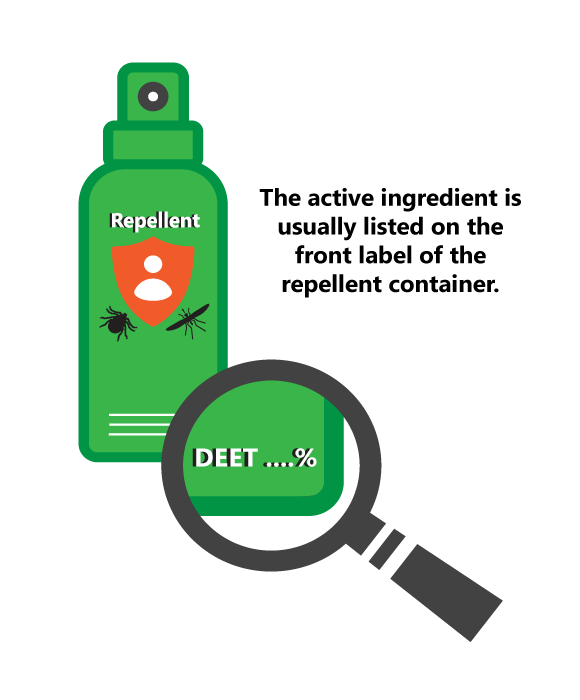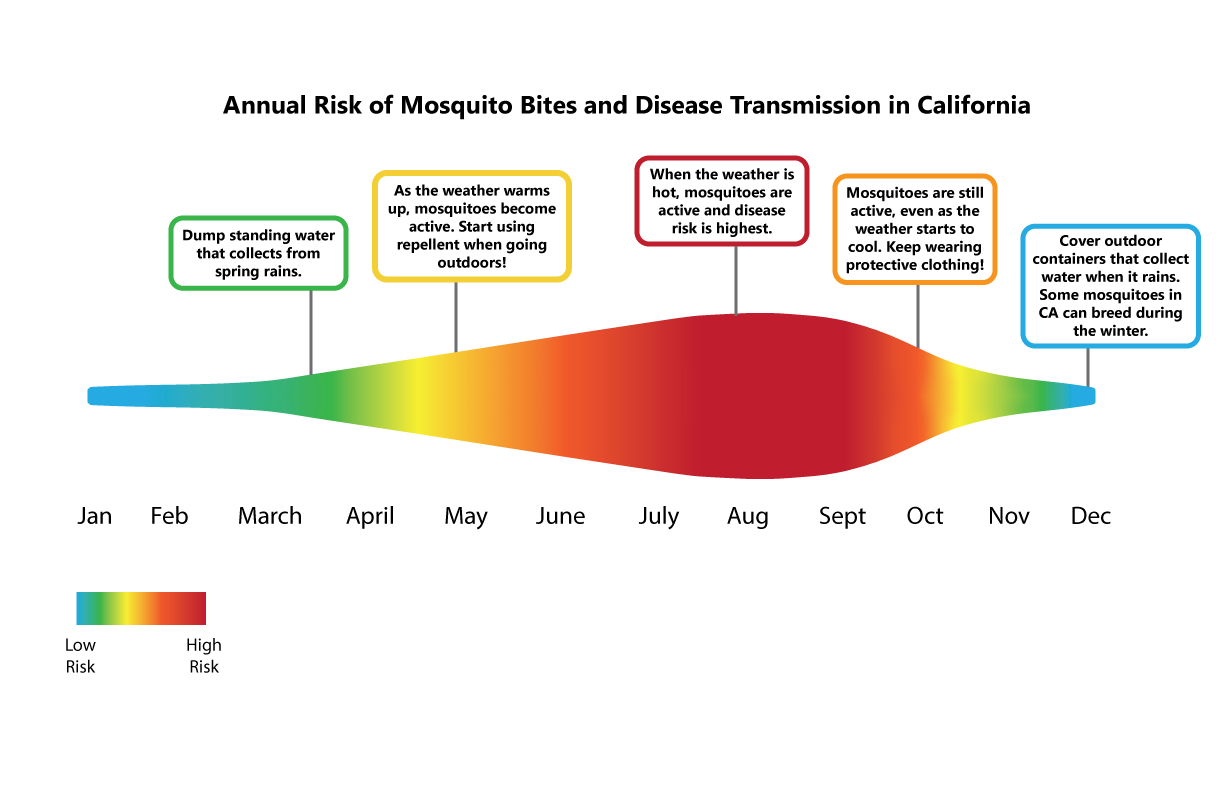Mosquito Repellent
When mosquitoes bite, they can spread viruses like
West Nile virus that can make people sick. The best way to prevent diseases spread by mosquitoes is to prevent mosquito bites. EPA-registered insect repellents work to prevent mosquito bites, and they are safe for use on pregnant and breastfeeding women and children.
When choosing a repellent to prevent mosquito bites, look for the following information on the product label:
 Active Ingredient
Active Ingredient
EPA-registered repellents will contain one of the following active ingredients:
Mosquito Protection
The label will usually list “mosquitoes” as one of the insects that the product repels. The label might also list mosquito-borne diseases that the product will help prevent.
-
Example: “Long Lasting Protection From
Mosquitoes, Ticks and Biting Flies”
-
Example: “Repels
Mosquitoes That May Carry
West Nile Virus”
Protection Time or Active Ingredient Percentage (%)
Not all products will list the number of hours that the repellent works to prevent mosquito bites. A repellent with a higher percentage of active ingredient will work longer to keep mosquitoes from biting you, but DEET products with more than 50% DEET will not usually provide extra protection against mosquito bites.
Choose a repellent that will protect you for the amount of time you plan to be outdoors. If you plan to be outside in your yard for a short time, a repellent with a low percentage of active ingredient (about 10%) will work well to prevent mosquito bites. However, if you plan to be outside in areas with mosquitoes for several hours, use a repellent with a higher percentage of active ingredient (20–30%) to protect you for a longer time. When you are sweating or getting wet, repellents don’t last as long.
Who should use mosquito repellent and when?
You should use repellent when you spend time outdoors, especially during warmer months of the year
when mosquitoes are most active (PDF) and you are more likely to be bitten. It’s also important to use repellent and prevent mosquito bites while traveling, whether it’s to other parts of California, or traveling to other states and U.S. territories, such as Puerto Rico, or other countries, such as Mexico.
Mosquitoes are found throughout the world and are common in the U.S. and California. Different types of mosquitoes live in different habitats, but mosquitoes are especially common in areas with standing water, even if the amount of water is very small.
Learn more about
where mosquitoes live.
Different kinds of mosquitoes are active at certain times of the day. For example, the Culex mosquitoes that spread
West Nile virus are found in most areas of California and bite most often at dawn and dusk. You should use repellent if you will be outside early in the morning or in the evening before it gets dark.
Older adults (over 60 years of age) are at greater risk of getting
very sick from West Nile virus and should use mosquito repellent to prevent mosquito bites.
The Aedes mosquitoes that can carry
dengue and Zika viruses (called Aedes aegypti and Aedes albopictus) are found in some areas of California (PDF) and bite most often during the day. At this time, the risk for Aedes mosquitoes spreading dengue, Zika, or chikungunya in California is low, but these diseases are found in other parts of the world and many people get infected while traveling. If you travel or live in areas with these Aedes mosquitoes, you should use repellent if you are outside during the day, including at dawn and dusk. For more information on
Aedes mosquitoes, visit the CDPH Aedes
Mosquitoes webpage.
Older adults (over 60 years), people with health conditions that weaken the immune system, and those who have had dengue before are at greater risk of getting
severe dengue. People in these groups should use mosquito repellent to prevent mosquito bites while traveling in tropical or nearby areas of the world.
Learn more about
areas with risk of dengue.
The greatest risk from
Zika is to a pregnant person’s developing baby. Pregnant people and those planning pregnancy should use mosquito repellent to prevent mosquito bites while traveling in areas where Zika could be spreading.
Learn more about
countries and territories at risk for Zika.
To protect children and babies from mosquito bites:
- Dress children in clothing that covers arms and legs
- Cover a child’s crib, stroller, or baby carrier with a mosquito net
- Use insect repellent according to label instructions
- Do not use repellents with OLE or PMD on children younger than 3 years
 click to enlarge (PDF)
click to enlarge (PDF)